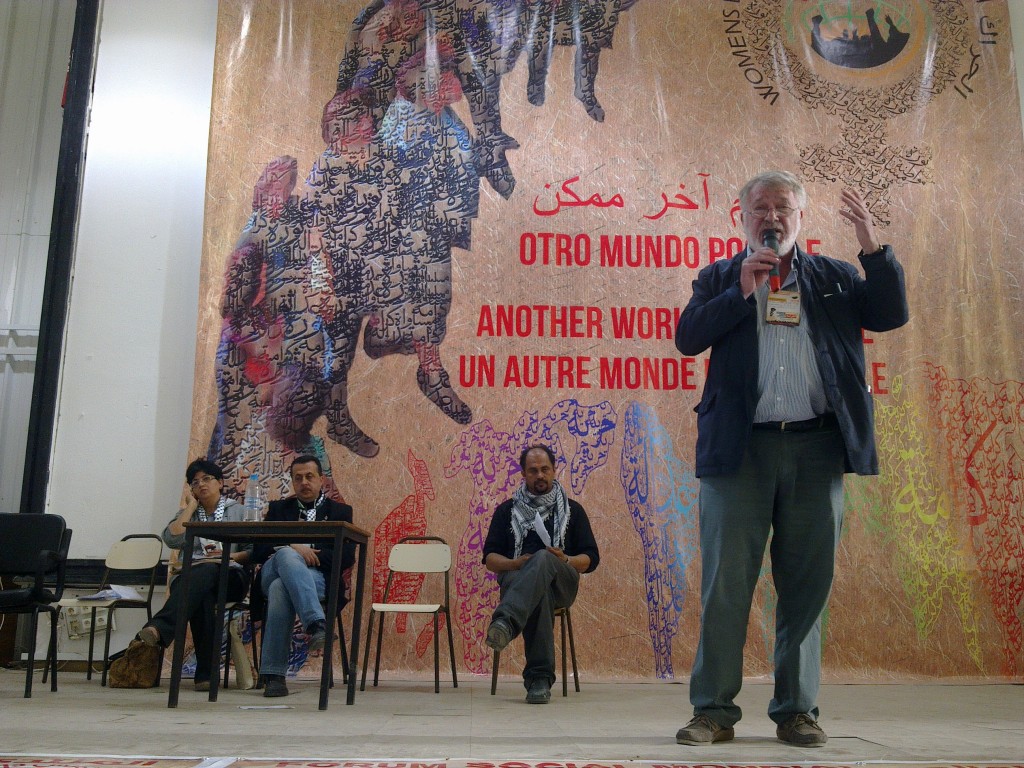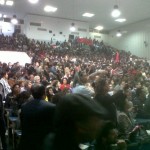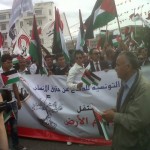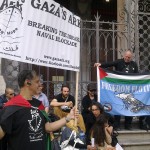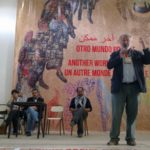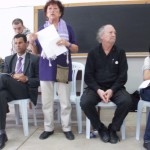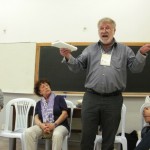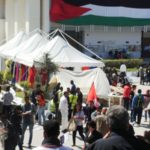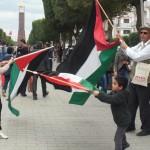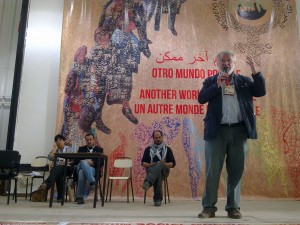 ECCP at the World Social Forum
ECCP at the World Social Forum
Tunis, 26 – 30 March, 2013
You can read another report in French here and Italian here
Under the banner of the Arab revolutions and freedom for Palestine, more than 50,000 individuals from around the world converged on the El Manar University Campus in Tunis from 26 – 30 March 2013, to participate in the 12th annual World Social Forum, in order to deliberate on a broad range of issues affecting our planet: From the ongoing Arab revolutions and Palestinian struggle; to the struggles against dictatorships, colonialism, racism and in favor of indigenous and land rights worldwide; against imperial wars and globalization; in support of immigrant rights; to environmental issues, women’s rights and gender diversity. 4,500 organizations co-sponsored a total of 1612 seminars, workshops and other activities, as well as 30 convergence assemblies. In addition, a Parliamentarian Forum was held, attended by 70 participants. Thematic tents and information stands spanned across the campus, while some 1800 journalists reported on the global, pluralistic event. This was all made possible, thanks to 10.000 young Tunisian volunteers who, inspired by their own revolution (still in progress), took full advantage of this unique opportunity to interact with people from across the globe who share the belief that ‘another world is possible’.
Although Palestine was high on the agenda during previous WSF’s, the centrality given to the Palestinian issue during the Tunis WSF was unprecedented; beginning with the Women’s Assembly during the opening on 26 March, Palestine took central stage. Given that Tunisia was the birthplace of the Arab revolutions, this can partially be understood as a defiance against the previous and other dictatorial Arab regimes, in which popular expression of the long-standing solidarity with the Palestinian people was largely repressed.
A large Palestine Tent served as a meeting point for Palestinians, representatives of international Palestine solidarity organizations and other interested participants to the Forum. Aside from a photo exposition and stands selling Palestinian products, the almost continually (over)crowded tent hosted a number of seminars, meetings among Palestinians and Palestine solidarity activists and informal discussions with the public. The seminar on Palestinian prisoners was particularly packed, including the significant participation of Palestinian representatives.
Palestinian delegates included members of the BNC, PARC, Palestinian Trade Union Coalition for BDS, PNGO, Addameer, Ajial, DCI-Palestine, Stop the Wall, Palestinian Popular Committees, Palestinian Youth-Gaza, Kairos Palestine, Women’s Affairs Center-Gaza, Ittijah, Aswat, and representatives of the PLO. An inspiring delegation of independent Palestinian youth attested to the fact that the new generation remains active and committed, while often critical of current policies. The PLO also organized a visit by an international delegation to the historical residence of President Arafat, as a reminder of the historical link between Palestine and Tunisia, which for ten years had served as the PLO Headquarter.
Alongside the Palestinian delegations, ECCP participated at the WSF with 20 representatives of 12 organizations from 8 European countries. In addition, we worked closely with other Palestine solidarity organizations, trade unions, etc., both from European and non-European countries.
The aim of the seminar organized by ECCP – ‘The experience of European campaigns in support of the rights of the Palestinian people. What coordination between European and Arab solidarity movements is possible?’ – was two-fold. The first aim was to portray our joint campaigns in support of Palestinian rights, as ECCP member organizations from across Europe, in collaboration with Palestinian organizations and a number of Israeli anti-colonial/anti-occupation movements. ECCP’s activities are guided by the principles of self-determination for the Palestinian people, respect for international law and the BDS campaign.
Among the Palestinian partners who addressed the audience of some 75 participants, were Rafeef Ziadah (Palestinian Boycott, Divestment and Sanctions National Committee – BNC) who explained the crucial role of the BDS Campaign, Abdullah Abu Rahmah (coordinator of the Bil`in grassroots resistance movement) who spoke of the weekly protests in Bil’in and other villages, participation of the international solidarity movement and the disproportionate Israeli violence used against them, and Randa Wahbe (Addameer) who presented the prisoner campaign to be launched on 17 April.
Other issues presented by various ECCP members included our campaign for a EU ban of settlement products, sanctions against Israel, civil missions to Palestine, the Gaza Freedom Flotilla and others.
The second aim of the seminar was to discuss how to collaborate with Arab organizations. The BDS campaign attracted particular attention of participants from various Arab countries, as the concept of BDS is quite new in the Arab world (in spite of the Arab tradition of boycotts and anti-normalization campaigns).
It was considered that the G4S campaign offered the best possibility for collaboration, as it is one of the few complicit companies which is active both in Europe and across the Arab world. In addition, it connects to the prisoner campaign, as G4S provides the security equipment used in Israeli jails, and to the general issue of surveillance which is increasingly affecting activists worldwide.
In addition to the ECCP seminar, a range of other Palestine seminars were organized by various partners, including seminars on BDS, the Russell Tribunal on Palestine and how to bring Israel to the ICC, Trade Union activism, the Freedom Flotilla, campaigns against specific companies and Palestine solidarity in general.
In the well attended Convergence Assembly on Palestine, presided over by ECCP Chairman Pierre Galand, participants had the opportunity to propose the points which they considered should be included in the final declaration. The next morning, following a long and lively discussion among Palestinian delegates and representatives of the various Palestine solidarity organizations in the Palestine Tent, the text was finalized and translated into English, French and Arabic for distribution during the closing march.
In the same spirit of international solidarity which was present throughout the Forum, Palestine once again took the center stage during the concluding event of the first ever WSF to take place in an Arab country. The final march on 30 March was organized to coincide with Land Day, the annual commemoration of the 1976 killing of six Palestinians while demonstrating against the Israeli confiscation of Palestinian land.
More than 15,000 people gathered on the emblematic Habib Bourguiba Avenue – the epicenter of the 2011 Tunisian uprising, which sparked the ‘Arab Spring’ throughout the Arab world. With a giant Palestinian flag leading the way, and hundreds of smaller Palestinian flags distributed among the marchers as they chanted ‘land, liberty, dignity’, the procession made its way though the center of Tunis to the Palestinian Embassy.
As a conclusion, we can all agree that the WSF was an exceptional experience! Not in the least due to the fact that it was held in the cradle of the Arab revolution, as well as due to the overwhelming solidarity with the Palestinian struggle for freedom and justice. Many new contacts were made and new ideas were explored. We need to closely follow the changes taking place in Palestine- within civil society and among social and political actors – in order to act in an effective as possible manner. Establishing/strengthening links with the social actors in the broader Arab world should also be seen as a priority, as well as exploring the possibility of developing a joint G4S Campaign. These are some of the tasks which lay ahead of us for the near future, stemming from the insights gained by our participation in the Tunis WSF of 2013.
Here you can read the final declaration of the entire World Social Forum in Tunis: Declaration of the Social Movements Assembly
Pictures from the WSF in Tunis:
